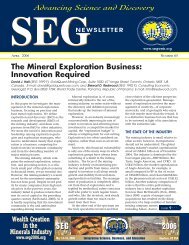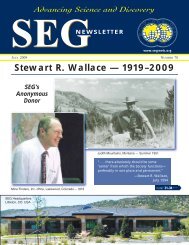SEG 45 Final_qx4 - Society of Economic Geologists
SEG 45 Final_qx4 - Society of Economic Geologists
SEG 45 Final_qx4 - Society of Economic Geologists
You also want an ePaper? Increase the reach of your titles
YUMPU automatically turns print PDFs into web optimized ePapers that Google loves.
OCTOBER 2005 • No 63 <strong>SEG</strong> NEWSLETTER 17<br />
MENTORING<br />
The Mentoring column is a regular feature <strong>of</strong> the <strong>SEG</strong> Newsletter, with contributions <strong>of</strong> up to 700 words. Personal anecdotes are sought<br />
from those who have mentored and/or who have been mentored by another. Those interested in contributing should contact Steve<br />
Garwin (Steve.Garwin@geoinformex.com) or Lucy Chapman (Lucy.Chapman@jcu.edu.au) regarding details <strong>of</strong> submittal.<br />
Regina Baumgartner, Student Member: An Interview<br />
by Steve Garwin (<strong>SEG</strong> 1996 F)<br />
Regina Baumgartner is a Ph.D. candidate at<br />
the University <strong>of</strong> Geneva in Switzerland,<br />
where she is working towards the completion<br />
<strong>of</strong> her thesis on the Metallogeny <strong>of</strong> the<br />
Cerro de Pasco district, Peru. Regina<br />
obtained her B.Sc. in geology and Grad.<br />
Dip. in geophysics from Lausanne,<br />
Switzerland. She completed her M.Sc. on<br />
the geochemistry and geochronology <strong>of</strong><br />
pegmatites in Brazil, while at the University<br />
<strong>of</strong> Geneva. She is fluent in French, English,<br />
Spanish, and German and in her spare time<br />
she enjoys sports. Regina was interviewed<br />
by Steve Garwin, co-editor <strong>of</strong> the <strong>SEG</strong><br />
Mentoring column, while at the Gordon<br />
Conference on Ore Deposits, held in New<br />
Hampshire during early August.<br />
Q: Regina, when did you know you<br />
wanted to be a geologist – was there a particular<br />
event that helped you make this<br />
decision?<br />
A: My father’s love <strong>of</strong> chemistry encouraged<br />
my enthusiasm in the sciences. My<br />
sister had a friend who was a geography<br />
student and he spent a lot <strong>of</strong> time in the<br />
field; as I have always loved outdoor<br />
sports, this interested me. In my final year<br />
at school, I visited the University <strong>of</strong><br />
Lausanne and attended a Sedimentology<br />
sedimentology class and made a new<br />
friend, who encouraged me to go into geology.<br />
These experiences coupled with my<br />
enjoyment <strong>of</strong> crystallography taught in a<br />
mathematics class during my senior year<br />
at high school encouraged me to pursue a<br />
university degree in geology.<br />
Q: Do you have a picture in mind for how<br />
your next ten years will develop?<br />
A: Ideally, I would prefer to work in a<br />
research role for a mining & and exploration<br />
company. I look forward to solving<br />
problems that involve both field and laboratory<br />
studies. I am particularly interested<br />
in field work in South America.<br />
Q: Is there a company that you would<br />
like to work for and why—what is it about<br />
this group that you like?<br />
A: Nothing specific at this point. I look<br />
forward to learning what it is like to work<br />
for a mining & and exploration company… ;<br />
see how the company works. I seek opportunities<br />
for mentoring in industry, which<br />
include instruction on the practical aspects<br />
<strong>of</strong> exploration, training programs, and site<br />
visits.<br />
Q: What would you like to see more <strong>of</strong> in<br />
the actions <strong>of</strong> companies today that would<br />
encourage you to join the industry?<br />
A: More industry visits to universities! This<br />
does not happen very <strong>of</strong>ten in Europe. It<br />
would be great if industry geoscientists<br />
would tell the graduating students why<br />
exploration is so interesting, what is<br />
expected <strong>of</strong> them and how to better prepare<br />
for a job in mining & and exploration.<br />
I would like to learn more about<br />
what sort <strong>of</strong> jobs are available in industry.<br />
Q: Have you had a vacation job? What<br />
did you learn from it? What did you like<br />
and what did you dislike?<br />
A: Yes, I had a summer job in Switzerland<br />
for one month in 1999. I mapped fractures<br />
and faults in an exploration tunnel<br />
through the Alps to help determine the viability<br />
<strong>of</strong> constructing a road through the<br />
mountain to access a ski resort. This work<br />
was for a geotechnical company. There<br />
were two <strong>of</strong> us (student employees), both<br />
females. We found it a little difficult at<br />
first, in that our supervisor was not consistent<br />
in his guidance and we had to become<br />
accustomed to a predominantly male environment.<br />
I enjoyed the mapping and compilation<br />
<strong>of</strong> data and the learning opportunity.<br />
I would like the chance to participate<br />
in a company or government internship<br />
program, but these are not common in<br />
Switzerland.<br />
Q: The <strong>SEG</strong> President wrote an article<br />
(Hitzman, January 2005) that outlined the<br />
skills <strong>of</strong> a modern geologist. He pointed out<br />
that pr<strong>of</strong>essionals today require a range <strong>of</strong><br />
skills to compete in the global market,<br />
beyond the core topics <strong>of</strong> a geoscience<br />
degree, including information technology,<br />
languages, social and environmental science,<br />
mineral economics; beyond an introductory<br />
level. Do you have a specific comment?<br />
Can you comment on how your<br />
degree prepares you for such an expectation?<br />
A: Generally, I agree. I understand the<br />
usefulness <strong>of</strong> speaking multiple languages,<br />
the ability to work in different cultures and<br />
interact amicably with local communities<br />
–— this makes the job more interesting<br />
(I love my field work in Peru)! I feel that I<br />
have the requisite language and computer<br />
skills to make a valuable contribution to<br />
the industry. In addition, I took courses on<br />
entrepreneurship while at university. I<br />
have had field experience through academic<br />
field programs, but these do not<br />
teach us how to be ready for industry.<br />
Q: Do you think there are extra challenges<br />
for females in the business?<br />
A: Oh yes… If a woman is single and<br />
ambitious, then there generally is not a<br />
problem. I feel that the challenge lies in<br />
striking a balance between working and<br />
raising a family. Women add an extra<br />
dimension to the team. Of course, it may<br />
be easier for an employer to not deal with<br />
some <strong>of</strong> these issues by hiring a guy—<br />
but this is only my perception and I do<br />
not intend to imply that there is discrimination<br />
in the industry. I have yet to work<br />
in industry, so it is difficult for me to know<br />
the situation.<br />
Q: Do you have a mentor? How did this<br />
relationship develop? How do you interact<br />
with your mentor?<br />
A: I am lucky to have several mentors in<br />
both academia and industry. I have<br />
gained knowledge and ideas by talking<br />
with others at meetings and field trips. I<br />
like to keep their advice and stories in my<br />
mind for potential application to my life<br />
and career. I keep in touch with some <strong>of</strong><br />
my mentors through email and in person,<br />
when we are able to meet up.<br />
Q: Do you have a request or question for<br />
members <strong>of</strong> industry?<br />
A: Yes, would it be possible for industry<br />
geoscientists to visit European universities<br />
more frequently to inform students what<br />
should be done in preparation for future<br />
employment? In addition, students would<br />
benefit from feed-back on the quality <strong>of</strong><br />
their work—because when one is adrift in<br />
the “sea <strong>of</strong> the Ph.D.” it is helpful to receive<br />
the opinions <strong>of</strong> those who are active in<br />
industry.<br />
Thank you Regina!<br />
If you would like to get in touch with<br />
Regina, or would like to contribute to this<br />
column via an interview, please contact<br />
Steve Garwin or Lucy Chapman. 1<br />
<strong>SEG</strong> NEWS






